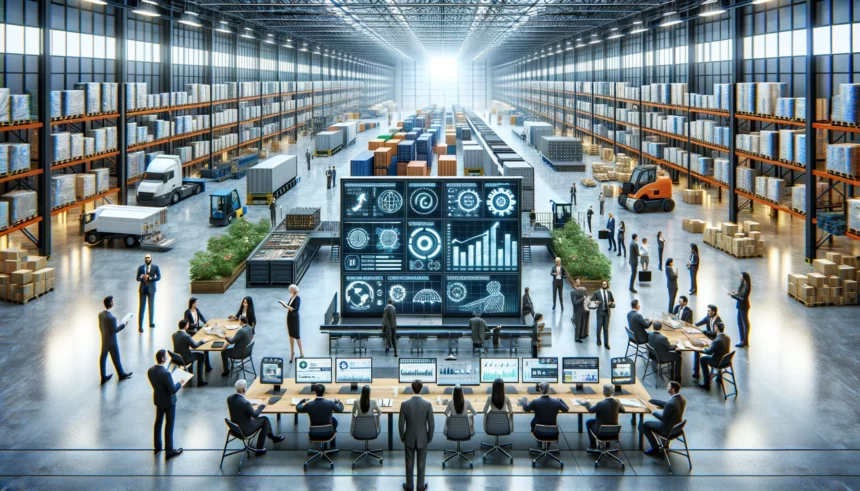In a world where global commerce intersects with pressing environmental challenges, it’s clear that companies and the broader logistics industry must escalate their sustainability efforts. Environmental sustainability within supply chains is no longer just about following rules; it’s a key strategy for corporate responsibility and a way to stand out in a crowded market.
On March 6, 2024, the U.S. Securities and Exchange Commission introduced new climate disclosure rules. These rules require publicly listed companies to report their Scope 1 and 2 emissions. These include emissions directly from a company’s operations and indirect emissions from energy use.
However, Scope 3 emissions, which cover the indirect emissions from a company’s supply chain and product use, were not included. Scope 3 emissions can account for 70% or more of a company’s carbon footprint, highlighting an area where businesses must voluntarily step up to address their complete environmental impact.
Prioritizing Sustainability in Global Trade
In global trade, cost reduction, reliability, and timeliness often take precedence over sustainability. Despite the omission of Scope 3 reporting in regulations, forward-thinking companies need to recognize the necessity of a unified approach to managing supply chains. This approach should include meticulous data practices, proactive supplier engagement, and the strategic use of technology to reduce emissions effectively.
Improve Carbon Accounting Practices
Robust carbon accounting is essential. It allows companies to understand their emissions across all scopes clearly. This clarity is important not only for internal management but also for communication with stakeholders, investors, and regulatory bodies. Companies must develop solid methods for measuring and reporting emissions, ensuring these practices cover all significant emission sources within the supply chain.
Collect High-Quality Data
Accurate data collection is crucial but can be challenging due to the complex web of entities in the value chain. Overcoming this hurdle is central to creating and managing decarbonization programs. Companies should define precise data requirements and engage with suppliers to ensure consistent and accurate data collection and reporting.
- Use global databases with standardized emission factors.
- Explore technologies to automate data aggregation.
- Conduct regular audits and quality checks to maintain data integrity.
Leveraging Technology and AI
Advancements in artificial intelligence (AI) can transform traditional carbon reporting into a predictive tool for corporate sustainability efforts. An AI-enabled carbon reporting system could integrate Internet of Things (IoT) sensors and machine learning algorithms to gather and analyze real-time data on energy consumption, resource utilization, and supply chain operations. This system could offer predictive analytics to forecast future emissions trends and enhance its recommendations over time.
Enhance Supplier Engagement
Involving suppliers in sustainability goals can lead to more stable supply chains and mutual innovations. Encouraging suppliers to set their own science-based targets aligns them with global sustainability efforts and promotes cooperation and shared investment in sustainable technologies.
Elevate Sustainability in Procurement
Procurement plays a crucial role in supplier relationships and should align with sustainability efforts. Integrating sustainability into procurement allows companies to influence their entire supply chain toward adopting more sustainable practices. This approach encourages innovative thinking around sourcing and vendor selection while helping companies mitigate risks related to resource scarcity and environmental regulations.
- Keep an open dialogue with procurement teams.
- Explore topics such as sustainable fuel adoption.
- Engage in partner strategies and supplier onboarding processes.
Collaborative Path Forward
Achieving a sustainable supply chain requires cooperation across all levels, from raw material suppliers to end retailers. Industry-wide partnerships and initiatives promoting transparency and collective responsibility can help reduce global emissions.
Conclusion
The path to sustainable supply chain management is both necessary and filled with opportunities for today’s businesses. As regulatory frameworks evolve and the global market increasingly values environmental stewardship, companies are called upon not just to comply but to lead.
By embedding sustainability deeply within their operations—through carbon accounting, data management, procurement, and supplier collaboration—businesses can mitigate their environmental impact, enhance operational efficiency, foster innovation, and build trust with stakeholders. Adopting these strategies helps companies contribute to a healthier planet and create more resilient and sustainable business practices that can thrive in a competitive global marketplace.
















